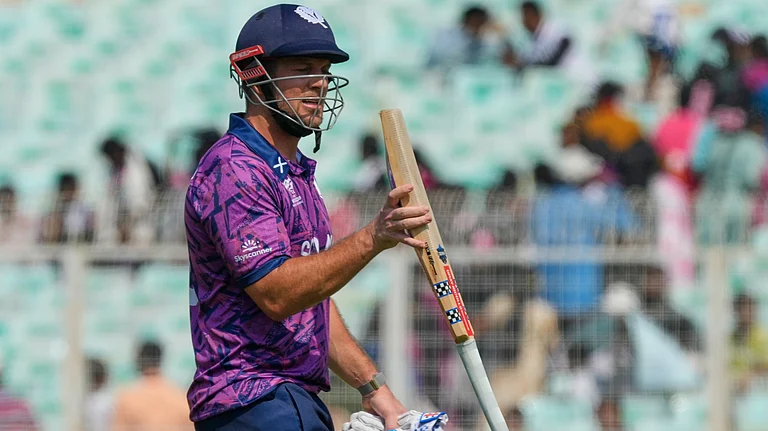I have to keep reminding myself that such once stalwart Congressmen as B.P. Maurya, Mani Shankar Aiyar,Ranga Kumaramangalam and Aslam Sher Khan have left the fold. On the other hand, Madhavrao Scindia, who fought the last election against the Congress party, is now spoken of as its best bet for prime minister. As for the outgoing prime minister, I.K. Gujral—the leader of a 'stop the BJP' alliance—he's now standing for Parliament with the backing of one of the BJP's principal allies.
What a lot's changed—but to what little consequence! The holy grail of stability, the new campaign watchword of every party, seems even more elusive now than it was before the '96 poll. Political demarcation lines are getting more fluid; parties which prided themselves on putting ideology before political opportunism have abased themselves in the pursuit of power and patronage.
There's one wildcard in these polls—a woman whose name makes these elections much easier for foreign correspondents to sell to their news desks. The world's media likes nothing more than a brandname, and you don't get a much bigger political brand than the Gandhis. When I left India, Sonia was simply a widow, holding court at 10 Janpath, keeping her political antennae well tuned, but showing no real sign of getting mired in the mud-slinging of an election campaign. Now she's arguably the most influential political figure in the country.
I've sometimes wondered what propelled her to take the leap into the vulgar hurly-burly of politics, a calling for which she once showed such disdain. Her fierce loyalty to her late husband, and determination to protect his reputation, must have been a factor. But I suspect she'd have kept aloof but for the sight of the party to which her husband and mother-in-law devoted their lives digging its own grave. Not only does that allow what some may see as the twin spectres of casteism and communalism to cloud India's future; it imperils what she might regard as her children's birthright.
It's difficult to keep a straight face when thinking of the fate now befalling the Congress party president. The 'old man in a hurry', Sitaram Kesri, has bawled himself hoarse appealing to Sonia Gandhi to save the party. Now he has successfully summoned the genie out of the bottle, there's no way he can ever get it back in again. If the Congress party should emerge from this election able to lead a coalition government—and in spite of its dismal political track record of late, that's far from impossible—the top posts will be in Sonia's gift, and Sitaram Kesri's position will be as conspicuously uncomfortable as that of P.V. Narasimha Rao after the last election.
There's a lot of fuss about the perils facing India's democracy if a foreigner is seen to call the shots. That tub-thumping opponent of all things firangi, George Fernandes (a BJP ally now, you say? Come on—this was the guy who once said he was going to set India alight by starting a real socialist party; described old Naxalites as "the bravest of the brave"!), has even hinted at some international conspiracy to plant an anti-national foreigner, cuckoo-like, in Race Course Road.
Not even the most paranoid petty nationalist could see Sonia as an agent of marauding international capitalism, intent on shackling India's military might and sucking its economy dry. The voters have the option of endorsing her party or rejecting her. That's what democracy's all about. What causes a shiver down my spine is the unaccountability of such a powerful politician. She has no constituency to which she's answerable; she's never stood for any party post—not too long ago she wasn't even a paid-up party member; she's not available to cross-examination by the media. Hers is dynastic politics with a vengeance—regal rather than democratically responsible.
If Sonia is bringing a bit of spice to what—for jaded foreign palates—looked, at first, likely to be a dull election campaign, she still hasn't propelled Indian politics to the top of the world's news agenda. Of course, there's a fair bit of competition—with the looming threat of military action against Iraq, and the squalls of a new sex scandal swirling around the White House. But, then, why should the world work itself into a frenzy about an election campaign which is arousing so little excitement among the electorate?
With less than two weeks to go until polling, Delhi shows few signs of an election campaign. Apart from souvenir-sellers outside BJP's Ashoka Road headquarters, there's next-to-no indication that the fate of a great nation will soon be decided. If the '96 elections were subdued because of Seshan's diktats over campaign spending, the '98 polls are low key because few people care about the outcome.
There are, for the political cognoscenti, some fascinating themes to the elections. The BJP, the only party which seems to have both discipline and a sense of purpose, has come to the conclusion that it lost out last time round for want of potential allies. So it's made good use of the past 18 months in courting regional power-brokers. Now it seems to have more friends that matter in the state capitals than the Congress—most sensationally, with its alliance with Jayalalitha, but also with the wooing (with mixed results) of Naveen Patnaik, R.K. Hegde, Mamata Banerjee and Lakshmi Parvathi. If the BJP falls short again, it won't be for want of trying.
The Janata Dal, on the other hand, could well feature in the Guinness Book—a governing party which could be reduced to single figures in the next Lok Sabha. It's the collapse of this party which could rob Jyoti Basu of the post he so clearly covets. What a story that would be! A Communist at the helm of the world's biggest democracy. But West Bengal's chief minister must know in his heart that he won't get a second chance. "Red Star over Delhi", ran the banner headline in one of Delhi's daily newspapers in the aftermath of the last election. That very day the CPI(M)'s central committee committed what Basu later called a historic blunder, and denied him the chance to lead a UF government.
Whatever the election result, however, India seems set to enter the next century with much the same set of problems it's faced ever since Independence—acute poverty, unequal distribution of resources, rapid population growth, and a festering feud with Pakistan. How sad that none of these issues has been addressed with any great ardour or imagination in the current campaign.


























